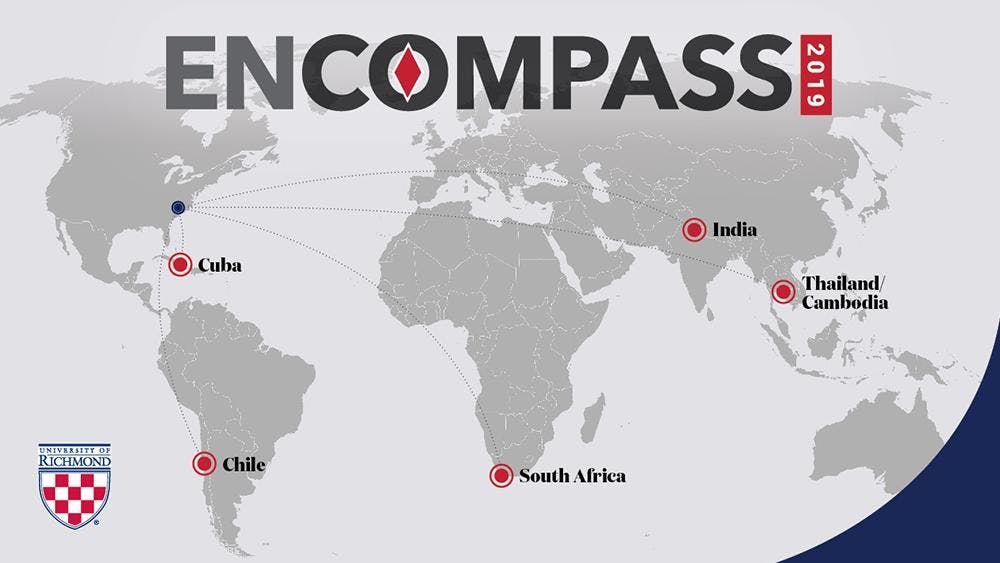The Office of International Education (OIE) has created new opportunities for students who wish to go abroad but may not have the chance, through a new donor-funded program.
Encompass, an experimental program created by the OIE, aims to overcome the obstacles preventing students from participating in study abroad opportunities, according to a press release.
Encompass offers full financial support for students who participate in the trips.
The program's short-term, faculty-led trips are aimed at the approximately 33 percent of the student body who is underrepresented in study abroad.
“We have the demographic data that says there are five groups that are less likely to go abroad: males, minority students, first generation students, athletes and science students,” said Martha Merritt, dean of international education. “So, if you have somebody that hits three of those categories, chances are much higher that they won’t go abroad.”
Both students who have no international experience and those who have traveled abroad are encouraged to apply.
“We want everyone on campus to feel empowered to go abroad if at all possible,” Merritt said. “Hearing from other students who thought they wouldn’t have international experience can be very encouraging.”
Merritt helped start the pilot Encompass programs with the generous contribution of a UR alumna. The program has five different inaugural trips to locations including South Africa, Chile, Cuba, India and one trip to both Thailand and Cambodia.
The first of these trips took place this past spring break to Santiago, Chile, from March 8 to 16.
The application for the Chile trip was open solely to students who were enrolled in political science and international studies associate professor Jenny Pribble’s first-year seminar, Latin American Politics and Film, or her 300-level course, Politics of Latin America and the Caribbean.
The opportunity to travel to Chile was not made known to students before registering for the two courses in order to allow the OIE to get a diverse sample of UR students, Merritt said.
Of the eight students who went, four were first-years, two were sophomores and two were seniors, according to Pribble, who accompanied students on the trip. Four of the students had previous abroad experience.
Enjoy what you're reading?
Signup for our newsletter
“We had to wait until classes were in session to tell students about it,” Pribble said. "Because of this, the application process was in the first week of classes and interviews were conducted the following week. We had to move very quickly because we knew we would be travelling over spring break.”
The application asked how the students would bring their experiences from abroad back to campus and what they hoped to gain from their first trip abroad, Merritt said. If students had previous travel experience, the application instead asked what they had learned from previous travels.
Over the course of the trip, students visited museums, popular sites in Chile and met with various government officials such as a former senator and a former minister, Pribble said. They also attended joint classes with Chilean students at Universidad Diego Portales and Pontificia Universidad Católica de Chile, where UR has an exchange program.
The trip offered full financial support for the eight students, including costs of airfare, accommodations, meals and entrance to the museums and various sites, Pribble said.
Senior Esteban Angeles, who is in Pribble’s Politics in Latin America class, enjoyed applying what he had learned in Pribble’s course to the trip.
“It’s one thing to just sit in a classroom and listen to your professor and do some readings, but it’s completely different when you’re hearing it from people who are actually affected by the things you’re talking about,” Angeles said. “It was really cool to listen to Chilean students who are so similar to us but so different and how they react to things differently than we do.”
The OIE asked that the students chronicle their trip in a journal and blog, and to use social media to share what they saw and learned.
When they returned to UR, the eight students were able to share their experiences with all of the students in both of Pribble’s classes.
“The journals and blogs will hopefully inspire other students to look into traveling abroad,” Merritt said.
Monti Datta, associate professor of political science, and Bob Spires, assistant professor of education, will lead the next inaugural Encompass trip. Six students will travel to Thailand and Cambodia from May 20 to June 8 to learn about human trafficking non-governmental organizations and other student programs, according to an information sheet about Encompass.
Contact features writer Allison Walters at allison.walters@richmond.edu and contributor Michaela Tevlin at michaela.tevlin@richmond.edu.
Support independent student media
You can make a tax-deductible donation by clicking the button below, which takes you to our secure PayPal account. The page is set up to receive contributions in whatever amount you designate. We look forward to using the money we raise to further our mission of providing honest and accurate information to students, faculty, staff, alumni and others in the general public.
Donate Now



